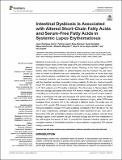Por favor, use este identificador para citar o enlazar a este item:
http://hdl.handle.net/10261/153071COMPARTIR / EXPORTAR:
 SHARE SHARE
 CORE
BASE CORE
BASE
|
|
| Visualizar otros formatos: MARC | Dublin Core | RDF | ORE | MODS | METS | DIDL | DATACITE | |

| Título: | Intestinal Dysbiosis Is Associated with Altered Short-Chain Fatty Acids and Serum-Free Fatty Acids in Systemic Lupus Erythematosus |
Autor: | Rodríguez-Carrio, Javier CSIC ORCID; López, Patricia CSIC ORCID; Sánchez García, Borja CSIC ORCID; González Solares, Sonia; Gueimonde Fernández, Miguel CSIC ORCID ; Margolles Barros, Abelardo CSIC ORCID; González de los Reyes-Gavilán, Clara CSIC ORCID ; Suárez, Ana | Fecha de publicación: | 23-ene-2017 | Editor: | Frontiers Media | Citación: | Front. Immunol. 8: 23 (2014) | Resumen: | Metabolic impairments are a frequent hallmark of systemic lupus erythematosus (SLE). Increased serum levels of free fatty acids (FFA) are commonly found in these patients, although the underlying causes remain elusive. Recently, it has been suggested that factors other than inflammation or clinical features may be involved. The gut microbiota is known to influence the host metabolism, the production of short-chain fatty acids (SCFA) playing a potential role. Taking into account that lupus patients exhibit an intestinal dysbiosis, we wondered whether altered FFA levels may be associated with the intestinal microbial composition in lupus patients. To this aim, total and specific serum FFA levels, fecal SCFA levels, and gut microbiota composition were determined in 21 SLE patients and 25 healthy individuals. The Firmicutes to Bacteroidetes (F/B) ratio was strongly associated with serum FFA levels in healthy controls (HC), even after controlling for confounders. However, this association was not found in lupus patients, where a decreased F/B ratio and increased FFA serum levels were noted. An altered production of SCFA was related to the intestinal dysbiosis in lupus, while SCFA levels paralleled those of serum FFA in HC. Although a different serum FFA profile was not found in SLE, specific FFA showed distinct patterns on a principal component analysis. Immunomodulatory omega-3 FFA were positively correlated to the F/B ratio in HC, but not in SLE. Furthermore, divergent associations were observed for pro- and anti-inflammatory FFA with endothelial activation biomarkers in lupus patients. Overall, these findings support a link between the gut microbial ecology and the host metabolism in the pathological framework of SLE. A potential link between intestinal dysbiosis and surrogate markers of endothelial activation in lupus patients is supported, FFA species having a pivotal role. | Versión del editor: | http://dx.doi.org/10.3389/fimmu.2017.00023 | URI: | http://hdl.handle.net/10261/153071 | DOI: | 10.3389/fimmu.2017.00023 | ISSN: | 1664-3224 |
| Aparece en las colecciones: | (IPLA) Artículos |
Ficheros en este ítem:
| Fichero | Descripción | Tamaño | Formato | |
|---|---|---|---|---|
| Intestinal Dysbiosis Is Associated with Altered.pdf | 1,17 MB | Adobe PDF |  Visualizar/Abrir |
CORE Recommender
PubMed Central
Citations
57
checked on 17-abr-2024
SCOPUSTM
Citations
81
checked on 07-may-2024
WEB OF SCIENCETM
Citations
71
checked on 25-feb-2024
Page view(s)
291
checked on 07-may-2024
Download(s)
292
checked on 07-may-2024

